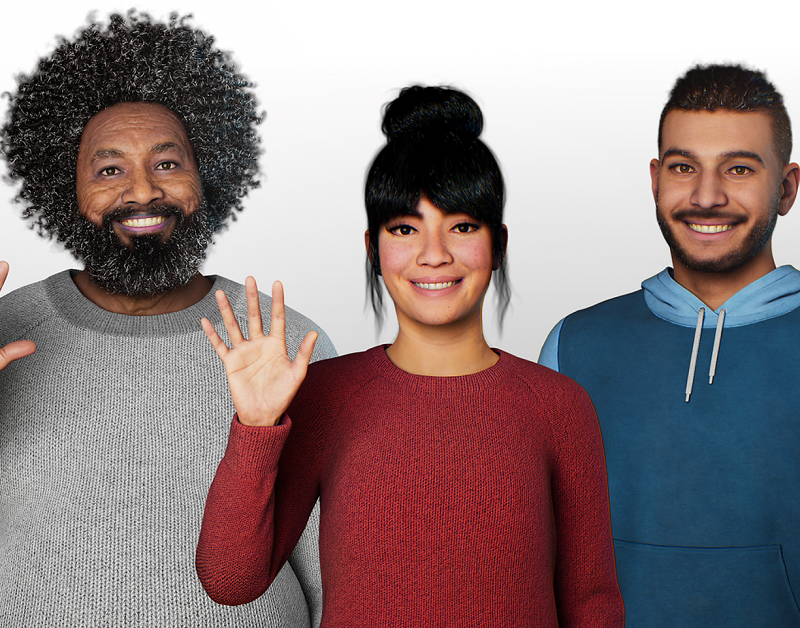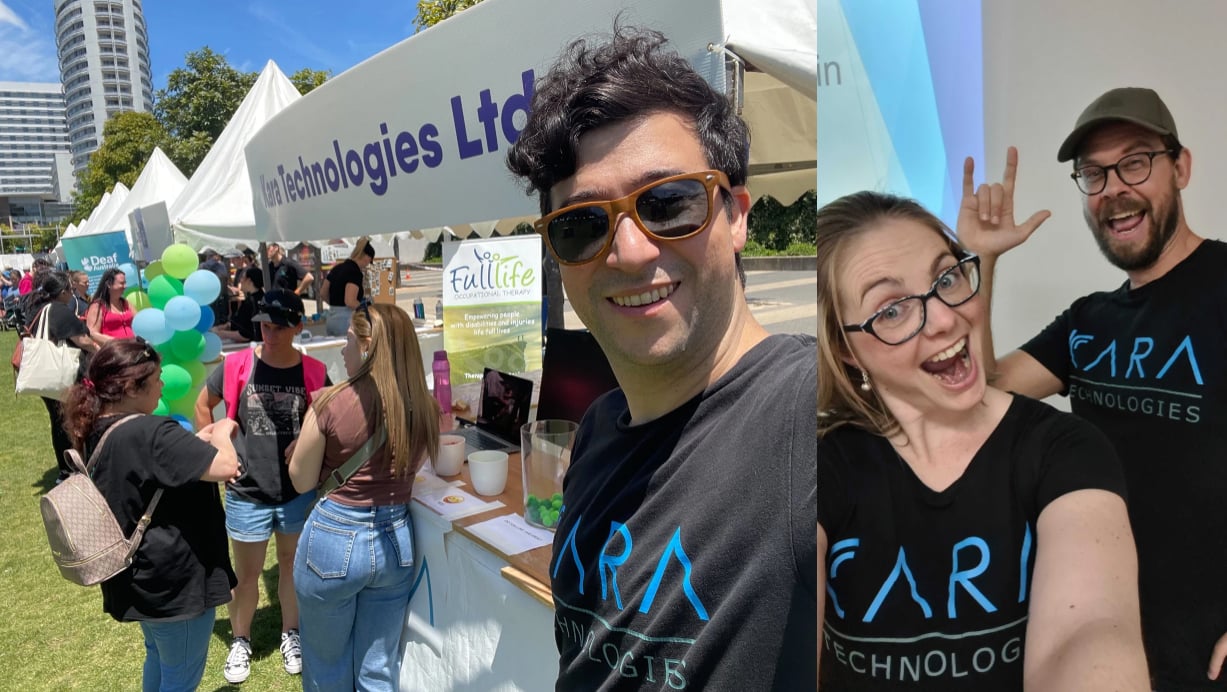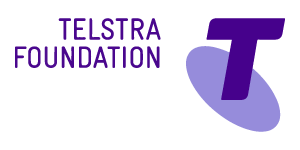
Kara Technology: Pioneering new emergency announcement systems in sign language
Kara Tech: Pioneering new emergency announcement systems in sign language
Organisation: Kara Technologies
Innovation Program: Humanitech Lab
Collaborators: Deaf Australia, Expression Australia, New South Wales State Emergency Service (SES), Fire and Rescue NSW (FRNSW), the National Council for Fire and Emergency Services (AFAC), Deaf people and Child(ren) of Deaf Adults (CODA) in New South Wales, Victoria and Queensland.
-
Challenge: In emergencies, such as floods, earthquakes, and bushfires, immediate information can be lifesaving. Yet in Australia, where approximately one in six people experience hearing loss, this information is often not accessible.
-
Technology: Kara Technologies aims to use its motion capture technology to create a sign language program that can be seamlessly used with other forms of emergency broadcast message systems.
-
Validation: Kara Technologies validated the need for this service in Auslan (Australian Sign Language) and an Australian context through consultations with Deaf communities in three states, Child(ren) of Deaf Adults (CODA), state governments, and emergency management stakeholders.
-
Feedback: Feedback from stakeholders was unanimous: this technology is important, wanted and has been ‘needed for decades’ to provide fast, life-saving emergency information to Deaf people in their first language of Auslan.

Arash Tayebi was 30 years old when he lost his hearing in one ear. Diagnosed with Meniere’s disease, he was told that hearing loss may spread to his other ear. Navigating life with new hearing difficulties opened a world of questions. Specifically: Why was access to sign language so limited in society?
Based in Auckland, New Zealand, Arash began searching for answers.
He found that sign language interpreters offer an essential service in translating information, however a lack of interpreters resulted in many missed opportunities for sign language translation – especially in urgent situations and emergencies.
Closed captions are often used to provide access to information, especially with film based media. This, however, creates another barrier for the wider Deaf community, because English is not their first language - sign language is. The average reading level of an adult Deaf person is fourth to fifth grade, due to inaccessible education and many other socio-environmental issues, making closed captions not the best solution.
As an engineer specialising in electronics and digital communications, Arash proposed using an approach with technology. One that created avatars – or ‘digital humans’ - that combined artificial intelligence with motion caption technology to provide engaging, expressive and on-demand sign language.
Collaborating with three co-founders - Sahar Izadi, Farmehr Farhour and Ken Erskine – Kara Technologies was born.
Over several years, Kara Technologies had successfully applied its ground-breaking technology in a range of situations in New Zealand Sign Language (NZSL) in New Zealand, yet it was unclear whether the solution would be suitable in other contexts.
To validate this approach, Kara Technologies launched an Australia-based project through the Humanitech Lab, an innovation program led by Australian Red Cross in collaboration with founding partner Telstra Foundation. The program is dedicated to explore new approaches to designing and developing technology for humanitarian impact by working alongside affected communities.
To discover whether this technology was needed – and wanted - by Australia’s Deaf communities and emergency management actors, Kara Technologies team travelled to Australia to learn more.
The Australian context
One in six Australians are affected by hearing loss, with approximately 30,000 Deaf Auslan (Australian Sign Language) users experiencing total hearing loss. Yet, there is limited opportunities for Deaf people to be informed by public safety announcements during an emergency in Auslan. The potential consequences of this are vast.
For decades, Deaf communities have been advocating for access to information alongside the hearing community. When public safety announcements are issued in airports, on public transport, or during disasters, these updates often cannot be accessed by Deaf people.
“These situations can be especially difficult to navigate during urgent and high stress situations, where community members may not take the time to stop and explain to a Deaf person what is happening while they dash off to safety,” said Arash Tayebi, CEO of Kara Technologies.
Australian Deaf people report that these experiences can be highly distressing, where they can fear for their life and feel unsupported from those around them.
To gain a greater awareness of the specific experiences of people experiencing deafness or hearing loss in Australia, the Kara Technologies team engaged with communities in Melbourne, Sydney and Brisbane at the end of 2022.
They shared an early demonstration of their product, which featured pre-recorded animation clips of emergency department messaging in Auslan that could be attached to an SMS.
A hypothetical situation was presented as to how this could be used.
A fire breaks out at 2am and has started raging out of control. The fire department creates an SMS that’s sent to all members of the community, which might include information, such as:
Fire > Location > Extreme risk > Evacuate immediately
The SMS would feature the text alongside the link to a video clip, which would present this information in sign language.
This would allow Deaf people to access emergency notifications at the same time as hearing people, receiving life-saving information in their native language instantly.
The feedback was overwhelmingly positive from the communities. As Australia had experienced several major disasters over the last three years - including the Black Summer bushfires, NSW and Queensland floods, and Covid-19 - the issue felt urgent.
Feedback includes:
“We gave SES text message straight away emergency but these are [in] wordings. Yours emergency sign language will do fantastic for deaf people [that] can’t read text. Excellent.” – Community feedback
“I think this is a fantastic thing. This has been needed for decades. I’m a CODA and have worried about my family safety a lot but this will definitely help keep Deaf Australians safe. Excited about improving Deaf agency and independence.” – Community feedback
“Add gas leak, hostage, cyclone. Fantastic idea i think. I support this.” – Community feedback

Creating technology with community
Kara Technologies operates by the philosophy of "For Deaf with Deaf", involving Deaf people and the Deaf community from beginning to end of its product development, design and implementation. When working with Humanitech’s Humanity First principles – an approach that’s being developed to guide the ethical development of technology in addressing humanitarian problems – this philosophy was at the heart of the team’s approach.
“It was very important to us to validate our assumptions with Australia’s Deaf community before developing our solution further,” said Arash Tayebi. “The feedback that was given is guiding us in making sure our solution is tailor-made for the people that will be using it.
Following validation, Kara Technologies’ next steps will be to collaborate with a state in Australia to trial the prototype its final product with stakeholders and communities. This will iron out any bugs and ensure that the system is ready to be launched more broadly.
There are currently more than 1.5 billion people - nearly 20 per cent of the global population - that live with hearing loss worldwide. While this project focused on Auslan, Kara Technologies’ product can be translated into any sign language in the world to increase accessibility.
Kara Technologies will pilot its solution with Red Cross and emergency services teams through the Humanitech Lab in 2023.

